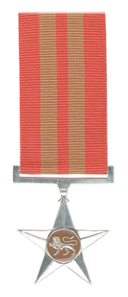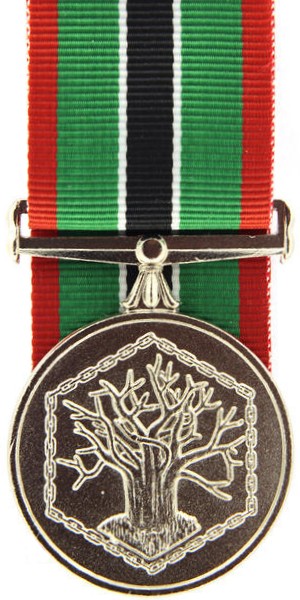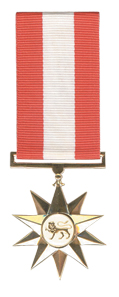
The Pro Merito Decoration, post-nominal letters PMD, is a military decoration for merit which was instituted by the Republic of South Africa on 1 July 1975. It was awarded to other ranks of the South African Defence Force for outstanding service of the highest order and utmost devotion to duty.

The Sandile Decoration, post-nominal letters SD, was instituted by the President of the Republic of Ciskei in 1988, for award to all ranks for meritorious service.

The Star for Bravery in Gold, post-nominal letters SBG, was instituted by the President of the Republic of South Africa in April 1996. It was awarded to veteran cadres of Umkhonto we Sizwe, the military wing of the African National Congress, who have distinguished themselves during the "struggle" by performing acts of exceptional bravery in great danger.

The Star for Bravery in Silver, post-nominal letters SBS, was instituted by the President of the Republic of South Africa in April 1996. It was awarded to veteran cadres of Umkhonto we Sizwe, the military wing of the African National Congress, who had distinguished themselves during the "struggle" by performing acts of bravery.

The Conspicuous Leadership Star, post-nominal letters CLS, was instituted by the President of the Republic of South Africa in April 1996. It was awarded to veteran cadres of Umkhonto we Sizwe, the military wing of the African National Congress, who have distinguished themselves during the "struggle" by distinguished conduct and exceptional combat leadership.

The Merit Medal in Silver, post-nominal letters MMS, was instituted by the President of the Republic of South Africa in April 1996. It was awarded to veteran cadres of Umkhonto we Sizwe, the military wing of the African National Congress, who had distinguished themselves during the "struggle" by exceptionally meritorious service and particular devotion to duty.

The Merit Medal in Bronze, post-nominal letters MMB, was instituted by the President of the Republic of South Africa in April 1996. It was awarded to veteran cadres of uMkhonto we Sizwe, the military wing of the African National Congress, who had distinguished themselves during the "struggle" by service of a high order.

The Operational Medal for Southern Africa was instituted by the President of the Republic of South Africa in 1998. It was awarded to veteran cadres of Umkhonto we Sizwe and the Azanian People's Liberation Army for operational service outside South Africa during the "struggle".

The South Africa Service Medal was instituted by the President of the Republic of South Africa in 1998. It was awarded to veteran cadres of Umkhonto we Sizwe and the Azanian People's Liberation Army for operational service inside South Africa during the "struggle".

The Service Medal in Gold was instituted by the President of the Republic of South Africa in April 1996. It was awarded to veteran cadres of Umkhonto we Sizwe, the military wing of the African National Congress, for thirty years exemplary service.

The Service Medal in Silver was instituted by the President of the Republic of South Africa in April 1996. It was awarded to veteran cadres of Umkhonto we Sizwe, the military wing of the African National Congress, for twenty years service.

The Service Medal in Bronze was instituted by the President of the Republic of South Africa in April 1996. It was awarded to veteran cadres of Umkhonto we Sizwe, the military wing of the African National Congress, for ten years service.

The Gold Star for Bravery, post-nominal letters GSB, was instituted by the President of the Republic of South Africa in April 1996. It was awarded to veteran cadres of the Azanian People's Liberation Army, the military wing of the Pan Africanist Congress, who had distinguished themselves during the "struggle" by performing acts of exceptional bravery in great danger.

The Bravery Star in Silver, post-nominal letters BSS, was instituted by the President of the Republic of South Africa in April 1996. It was awarded to veteran cadres of the Azanian People's Liberation Army, the military wing of the Pan Africanist Congress, who had distinguished themselves during "the struggle" by performing acts of bravery.

The Star for Conspicuous Leadership, post-nominal letters SCL, was instituted by the President of the Republic of South Africa in April 1996. It was awarded to veteran cadres of the Azanian People's Liberation Army, the military wing of the Pan Africanist Congress, for distinguished conduct and exceptional combat leadership during the "struggle".

The Gold Decoration for Merit, post-nominal letters GDM, was instituted by the President of the Republic of South Africa in April 1996. It was awarded to veteran cadres of the Azanian People's Liberation Army, the military wing of the Pan Africanist Congress, for outstanding service and utmost devotion to duty during the "struggle".

The Silver Medal for Merit, post-nominal letters SMM, was instituted by the President of the Republic of South Africa in April 1996. It was awarded to veteran cadres of the Azanian People's Liberation Army, the military wing of the Pan Africanist Congress, for exceptionally meritorious service and particular devotion to duty during the "struggle".

The Bronze Medal for Merit, post-nominal letters BMM, was instituted by the President of the Republic of South Africa in April 1996. It was awarded to veteran cadres of the Azanian People's Liberation Army, the military wing of the Pan Africanist Congress, for service of a high order during the "struggle".

The Silver Service Medal was instituted by the President of the Republic of South Africa in April 1996. It could be awarded to veteran cadres of the Azanian People's Liberation Army, the military wing of the Pan Africanist Congress, for twenty years exemplary service.

The Bronze Service Medal was instituted by the President of the Republic of South Africa in April 1996. It was awarded to veteran cadres of the Azanian People's Liberation Army, the military wing of the Pan Africanist Congress, for ten years of exemplary service.




















